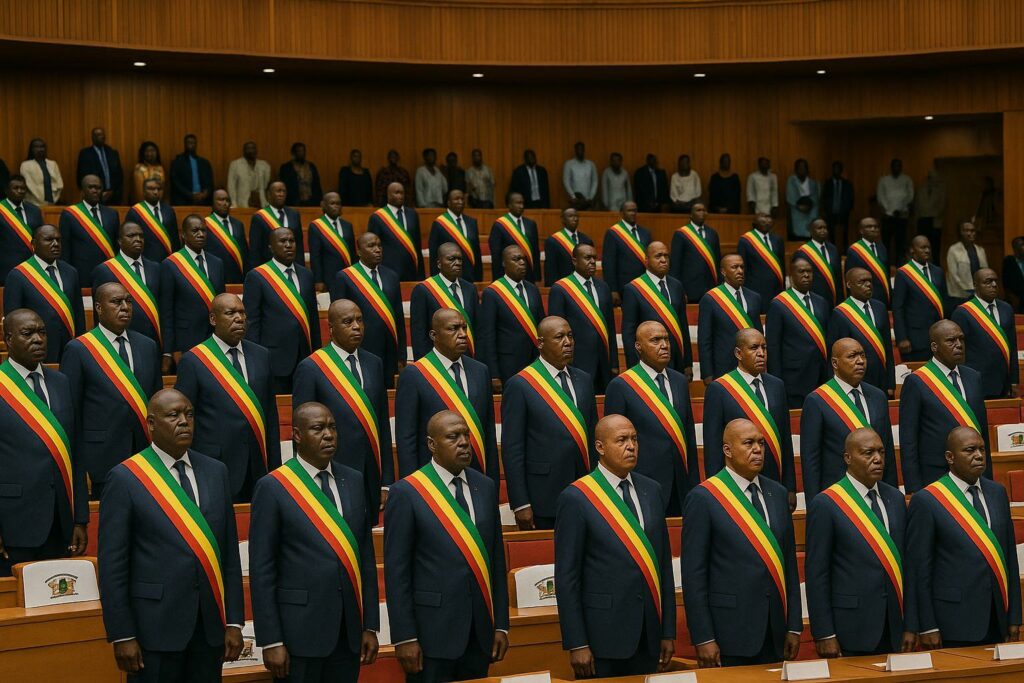Parliamentary Oversight at the Forefront
The final gavel of the ninth ordinary session of the Congolese National Assembly resonated far beyond the chamber’s marbled walls. In a carefully calibrated address, Speaker Isidore Mvouba urged deputies to “shadow the government at the belt,” invoking a sporting metaphor to convey a measured yet unambiguous call for intensified legislative scrutiny. Far from signalling confrontation, the appeal fits within the presidency’s broader narrative of constructive accountability, a theme that has gained salience amid regional macroeconomic headwinds and the ongoing reform programme agreed with the Central African Economic and Monetary Community, CEMAC.
Diplomatic observers noted that the timing of Mr Mvouba’s message aligns with the International Monetary Fund’s most recent Article IV consultation, which praised Brazzaville’s progress on debt transparency while exhorting further vigilance. By emphasising the Assembly’s prerogatives, the Speaker implicitly reassured partners and investors that fiscal consolidation will remain on track even as the executive accelerates social investments.
Legislative Productivity and Health Infrastructure
During the four-month sitting, deputies considered thirty-two items and adopted twenty-seven, a ratio that Mr Mvouba lauded as evidence of an increasingly proactive lower house. Particularly emblematic were the bills establishing general hospitals in Sibiti and Ouesso, strategic towns whose medical facilities have long required modernisation. Once inaugurated by President Denis Sassou Nguesso, the two institutions are expected to relieve pressure on Brazzaville’s congested referral centres and extend specialised care to the Lékoumou and Sangha departments.
Health economists consulted by this review stress that secondary cities receive just under a fifth of national hospital bed capacity, despite housing more than a third of the population. The forthcoming hospitals, designed with modular theatres and digital diagnostics, are therefore poised to become regional anchors for public health, an objective congruent with the African Union’s Agenda 2063 focus on human capital.
A New Tax Convention with Türkiye
Beyond domestic concerns, lawmakers authorised ratification of a bilateral convention on income taxation with the Republic of Türkiye, signed in Ankara on 14 November 2024. The instrument eliminates double taxation, introduces reciprocal administrative assistance and embeds anti-avoidance clauses consistent with the OECD’s Base Erosion and Profit Shifting framework.
For Brazzaville, the accord consolidates a rapidly expanding commercial corridor: trade with Türkiye surpassed 250 million dollars last year according to customs data, with Congolese crude and timber flowing eastwards and Turkish construction materials shipped in return. Ankara’s embassy welcomed the vote as “a milestone that will galvanise mutually beneficial investment.” Civil servants involved in the negotiations underscore that the convention also supplies a template for forthcoming treaties with Asian partners, thereby diversifying the Republic’s fiscal diplomacy.
Context of Fiscal Reforms and Debt Management
The session unfolded against a backdrop of cautious optimism over public debt trends. Treasury figures indicate that the public-debt-to-GDP ratio fell below the CEMAC convergence threshold of 70 percent for the first time since 2015, aided by debt-reprofiling agreements and recovering hydrocarbon receipts. However, rating agencies continue to flag vulnerability to oil-price volatility. Consequently, the Assembly’s Budget and Finance Committee intends to institutionalise quarterly hearings with economic ministers, a practice inspired by Westminster traditions and welcomed by the World Bank as an element of sound governance.
Such measures dovetail with the government’s Priority Action Plan, which emphasises greater domestic revenue mobilisation. Deputies interviewed emphasised that robust oversight can accelerate enactment of customs digitalisation and broaden the tax base, while shielding social spending on health and education.
Balancing Accountability with Cohesion
While the Speaker’s rhetoric underscored vigilance, he was equally generous in acknowledging the executive’s receptiveness to parliamentary input. Analysts perceive a calibrated equilibrium: asserting autonomy without undermining policy coherence. For seasoned diplomats in Brazzaville, this equilibrium remains a cornerstone of the Republic’s political stability and an important signal to international lenders preparing mid-year disbursement reviews.
Looking ahead, the Assembly has already scheduled an extraordinary session to address energy-sector restructuring and to examine the implementing decrees of the investment code adopted last year. Expectations are that the cooperative yet exacting tone set during the ninth session will persist, reinforcing institutional credibility at a moment when global investors increasingly price political governance into risk metrics.

